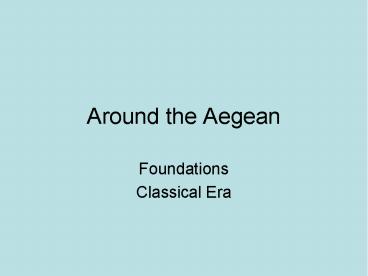Around the Aegean - PowerPoint PPT Presentation
Title:
Around the Aegean
Description:
Around the Aegean Foundations Classical Era What were the geographic influences in the development of the Greek city states and later empire? Greece depended entirely ... – PowerPoint PPT presentation
Number of Views:129
Avg rating:3.0/5.0
Title: Around the Aegean
1
Around the Aegean
- Foundations
- Classical Era
2
What were the geographic influences in the
development of the Greek city states and later
empire?
- Greece depended entirely on rainfall for
agriculture - rocky terrain - overland travel, trading, and
communication very difficult - Small city-states developed - commerce was linked
to the sea
3
In what way are the geographical influences
different for the development of Greek
civilization than river valley civilizations and
those in the Americas?
- Crete and Greek mainland civilizations were the
results of the fertilizing influence of
previously established civilizations - Few natural resources unsuitable farming land
import lots of food - Seaborne trade results in commercial and
political relations with other peoples in the
region
4
How was Persian religious experience different
than other early civilizations?
- Persians believed that water was not to be
damaged and worshiped fire at special altars - continued to worship some major deities from
their pagan past - Zoroastrianism fostered the belief in one supreme
deity, encouraged moral and ethical virtues, and
promised salvation - Believed that individuals would be rewarded or
punished in the afterlife for their actions
5
Democracy in Greece? Accidental or Inevitable?
- Citizenship was eventually extended to all free,
adult males - Greek democracy was not truly democratic
because a sizable portion of the population
(women, slaves, and immigrants) were not citizens
- It was a daring and influential experiment with
non-monarchal government
6
What is the relationship between the trade and
wealth of the Athenians and their acknowledged
legacy to knowledge?
- Athenian wealth supported the arts and sciences,
and traveling teachers - Athenians trained by Sophists had an advantage in
politics and the courts - Socrates was brought to trial for corrupting
Athenian youth and introducing unorthodox
religious beliefs - His trial revealed intellectual, social, and
political divisions in Athens and changed the
course of intellectual life. - Platos Academy became an institution for higher
education. The Socratic method of question and
answer became a new way of reaching a deeper
understanding of intellectual issues
7
What connection do you see between the ancient
battle of Greece and Persia and present day
conflicts?
- The Persian Wars began when Persia responded to a
revolt of Greeks in Persian-controlled
territories - Today the western world and the Middle East still
have conflicts of belief surrounding religious,
cultural and social ideals
8
How was the culture of Greece dispersed and
allowed to become their greatest legacy?
- The Hellenistic Age - from about 323 to 30 B.C.E.
- During the Hellenistic Age, Greek culture acted
as the dominant influence on northeastern Africa
and western Asia - The city of Alexandria in Egypt epitomized the
Hellenistic Age through its art and architecture,
its great library, and its cosmopolitan culture - Greeks culture remained a powerful influence on
these areas
9
How do the political strengths of the Persian
Empire contribute to its expansive nature over
time and space?
- The empire was divided into twenty provinces,
each ruled by a Persian satrap or governor. - The Persians also maintained their control by
building patrolling the royal roads - Darius was also famous for his law code, law of
the King. - The Persians succeeded because they were willing
to adapt to local circumstances, to learn from
those with experience, and to utilize the skills
of non-Persians.































